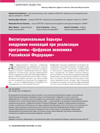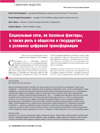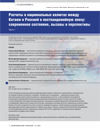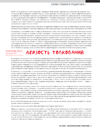Institutional Barriers to the Innovations Introduction in Implementing the “Digital Economy of the Russian Federation” Program
DOI: 10.33917/es-8.174.2020.36-43
The institutional environment study makes it possible in an era of high uncertainty to identify patterns that impede changes, implementation of which currently determines not only performance indicators, but is also critical for survival. Based on analysis of the current state of the digital economy development in the Russian Federation, taking into account experience of the first half of 2020, as well as approaches to organization and performance indicators of the “Digital Economy of the Russian Federation” national program, assumptions are made regarding the main components of the institutional environment for digital transformation. Institutional barriers, that impede economic growth as a result of increased informatization of processes, were compared. The main reason for the formation of institutional barriers is considered to be the low speed of response, the delay in transformation of the institutional environment in relation to establishment that ensures the maximum positive effect of applying digital technologies







